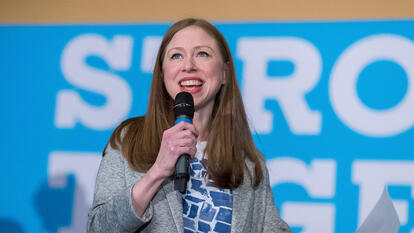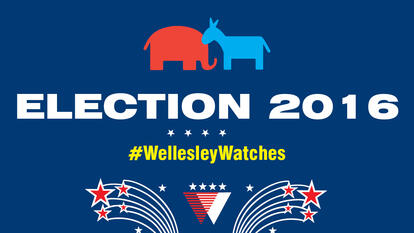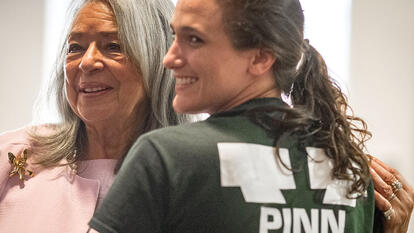
Disrupting the narrative: Sara Minkara ’11 on a holistic approach to disability rights
Sara Minkara ’11 is the special advisor on international disability rights at the U.S. Department of State’s Bureau of Democracy, Human Rights, and Labor. During Wintersession, she gave a presentation to fellows of the Albright Institute, which is celebrating its 15th anniversary this year, about her role and her efforts to challenge how people think about disability and disability rights.
While she was on campus, Minkara talked with Shannon O’Brien about her work, her time at Wellesley, and more.
(This conversation has been lightly edited for length and clarity.)
Shannon O’Brien: How does it feel to return to Wellesley in your current capacity?
Sara Minkara: It’s always really nice being back here at Wellesley. It’s just really beautiful. And coming back here as [the] special advisor—for me, Wellesley is a significant part of why I’m here and how I ended up here. I want to always be able to give back and be able to really keep connecting with the Wellesley community.
SO: How did your experiences at Wellesley help you get where you are today?
SM: Before I entered Wellesley, I was a shy, timid student. Stubborn, still, but shy. And then Wellesley gave me the space to grow. To learn more about myself, to learn about my passions, my desires, my commitments. I was able to major in subjects that I was passionate about, like math and economics, but I was able to also expand beyond that. And I ended up starting my nonprofit organization [Empowerment Through Integration] when I was at Wellesley. So it gave me the space to really explore and build a community mobilized toward an issue that I’m passionate about, and that really resulted in my journey on disability inclusion and disability rights.
SO: What do you do in your role as a special advisor?

SM: I lead, with my team, the U.S. government foreign policy on disability across the globe. We lead disability policy across all regions, focusing on not only the human rights lens, but also the value-based lens. What I mean by that is getting the international community to understand we can never achieve full peace, prosperity, and security if we don’t include the 17% of the world’s population [who identify as living with disability]. We need to make sure they’re at the table. We need to make sure their needs are addressed, but we also need to make sure that they are able to bring forward their value that we will benefit from. And [we need to] get our State Department colleagues to see disability as part of their own work, their own priorities, and see the value in how disability is part of their own kind of framework.
It’s been a beautiful journey. We’ve been to 25 countries so far. We focus on building capacity, fostering accountability, and most importantly, I believe, disrupting the narrative, because you can have all the policies in the world on disability, but who implements the policies is society. And until we change the narrative on disability across the globe, we’ll never achieve full disability inclusion.
SO: How have you used disability inclusion as a tool of diplomacy?
SM: Disability is a noncontroversial issue. Everyone can agree that the inclusion of persons with disabilities is important. How and where and what resources and building capacities are sometimes the challenges, but the issue will open doors, and it is one most countries are willing to engage with us on. There’s strength and power to that. How do we use that to really achieve more impact? And this goes back to us doing a U.S.-China coordination meeting. That goes back to us being able to engage with all the Central Asian countries on disability inclusion. So there are a lot of opportunities for [using disability as] an amazing, amazing tool in the diplomacy world.
SO: You’ve cited “disrupt the narrative on disability” as one of the focus areas of your office. How might Wellesley students disrupt the narrative?
SM: I really want people to think honestly: How do they perceive disability? How does society perceive disability? To be honest, the narrative is still a burden: less than, different, incapable, suffering, struggling, charity, whatever it is, right? That’s still very much the prominent narrative. So understanding that, and understanding that we want to get to a value-based narrative that every single person out there has a value to contribute to the world. How do we understand barriers of accessibility for persons with disabilities? How can we break them down? That’s one layer.
The second layer is disability should be part of every single major, curriculum, whatever field you’re in. How do you bring more disability language, and stories and contexts to the humanities, the sciences, the economic field? Disability should be mainstreamed into every single space—disability and climate change, disability in the AI world, disability and peace and security.
SO: When you’re not busy with work, are there any books or podcasts you are enjoying right now?
SM: Currently, I am reading the detective series by J.K. Rowling, Cormoran Strike. I really enjoy listening to mystery thrillers and crime podcasts, especially when I’m traveling. Those transcontinental flights can become very long if I don’t have anything to read.
SO: If you could have dinner with anyone, living or dead, who would it be?
SM: I have two people: the Prophet Mohammed and Mary, mother of Jesus. These choices may seem contradictory, but they speak to my personal connection with faith, which informs a significant part of my identity.
SO: What would people be surprised to know about you?
SM: I think the greatest surprise to people is that I am an introvert. It seems strange when you consider that my job involves connecting with people around the world, but I really value my personal time to relax and rejuvenate. Then I can go ahead and make good trouble the next day.



